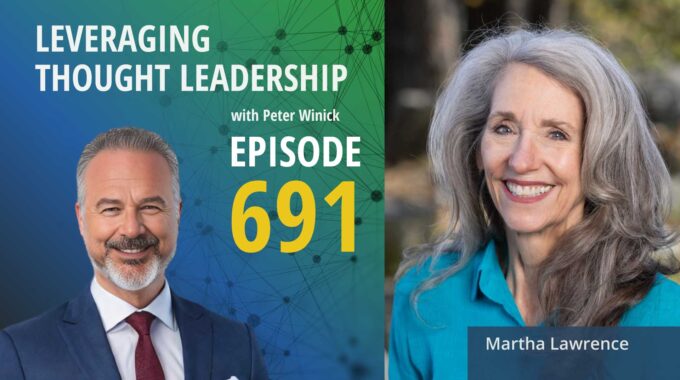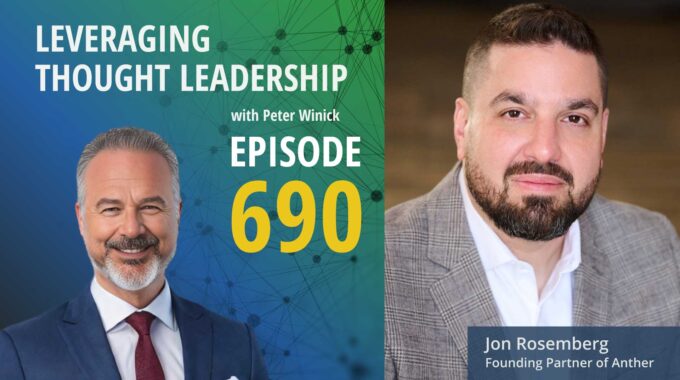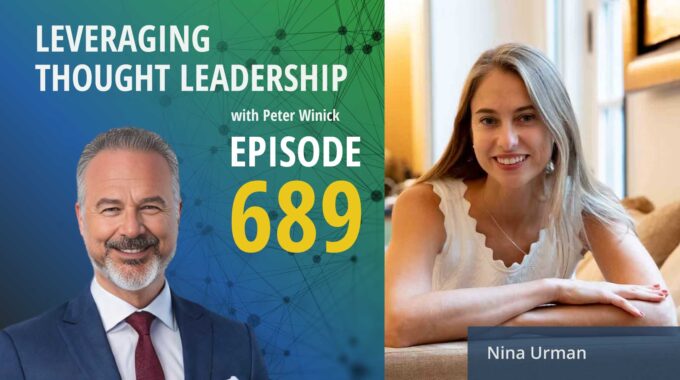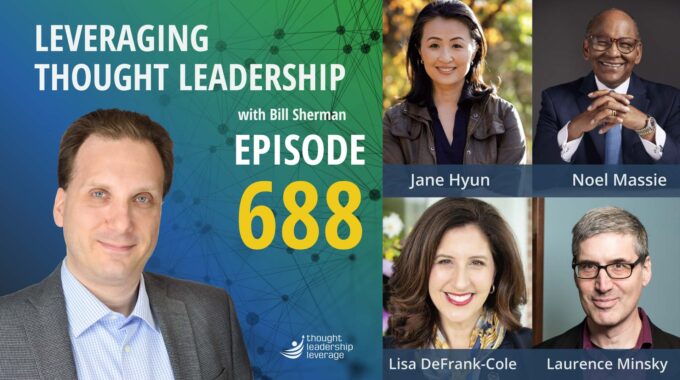A practical framework for leaders who want clarity and performance Timeless leadership principles that scale…
Making a Business Case with Your Book Proposal | Matt Holt
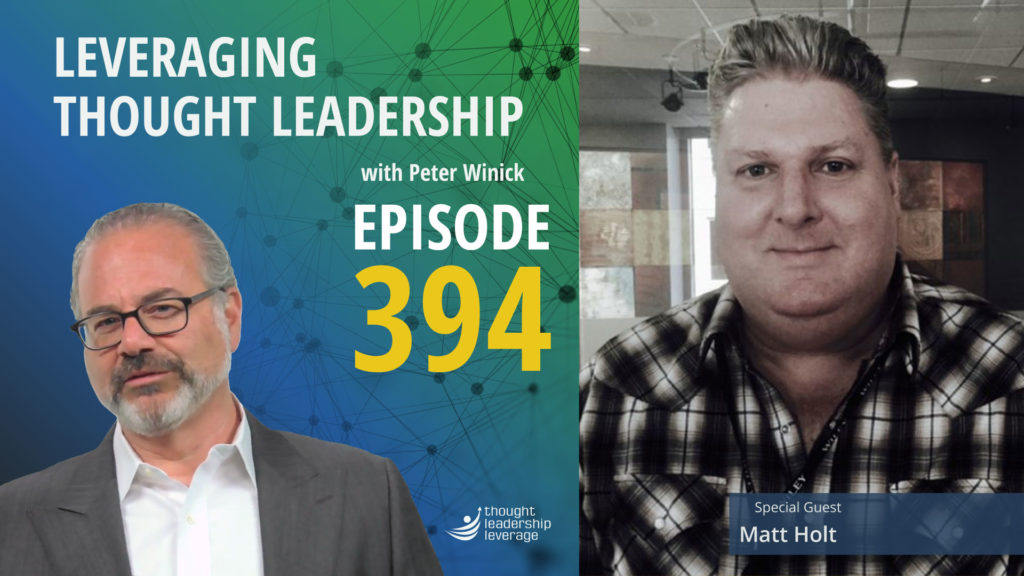
Crafting a solid book proposal and business plan for going to scale.
An interview with Matt Holt about best practices for book proposals and publishing.
It is easier now than ever before to get a book published but there is still a lot of misconceptions and bad information out there about what you’ll need to do and what others will help you with in order to have a successful book.
To ensure our listeners get only the best information we’ve invited Matt Holt, Editor-in-Chief of Matt Holt Books (a BenBella Books Imprint) to join us. Matt was previously Senior Vice President and Executive Publisher at John Wiley & Sons, where he oversaw a team of 85 staff. Over his 27-year career, he’s acquired over 1,000 titles and published 10,000 titles!
We start with the questions you need to answer before you even set pen to paper. Matt believes you need to know the goal of the book, why you are writing it, and what publishing model will best suits your business.
Having had literally thousands of proposals cross his desk Matt is able to know within 30 minutes if he wants to explore a proposal further. Matt shares what he is looking for in a proposal and even the methods he uses to look into a potential author beyond the pages turned into him.
Last, we discuss the tension that often exists between author and publisher. The author is making a long-term multi-year connection while the publisher will need to move onto the next project before long. Matt explains what both sides can do to provide the transparency that will be needed for everyone to achieve their goals.
If you want to ensure your proposal doesn’t get discarded into the “pass” pile you’ll want to listen to this episode.
Three Key Takeaways:
- You can get a book done quickly and cheaply, or you can get it done right.
- Thought Leaders who are also practitioners often have an advantage in promoting their books as they already are in direct contact with their audience.
- A book is a mass-market tool, you’ll need methods of taking your content to scale if you want to fully capitalize on your book launch.
If you need a strategy to bring your thought leadership to market, Thought Leadership Leverage can assist you! Contact us for more information. In addition, we can help you implement marketing, research, and sales. Let us help you so you can devote yourself to what you do best.
Transcript
Peter Winick Welcome, welcome, welcome. This is Peter Winick. I’m the founder and CEO of Thought Leadership Leverage, and you’re joining us on the podcast today, which is Leveraging Thought Leadership. So today is going to be fun. I have an old pal, Matt Holt, with us today. Matt is the editor in chief of Matt Holt Books, which is a Ben Bella imprint. He was previously senior V.P. and executive publisher at a little publishing house called John Wiley and Sons, where he oversaw a team of 85. He’s had an almost 30-year career. He’s acquired over 1000 titles and published ten thousand titles. If I went into some of the highlight reel that we’d run out of time. So, before I do that, let’s just jump in. Matt, how are you today?
Matt Holt I’m good, Peter. Good to see your face in warm Florida.
Peter Winick Yeah, exactly. So, you know, you’ve been at the sort of epicenter of publishing for a long, long time. Right. And let’s just talk about misconceptions, because I literally had you know, it’s not even lunchtime today and I’ve already had two calls with clients telling me their fantasy plans of I’m going to write a manuscript, manuscript, get an agent, and then the publisher will publish it. Give me a lot of money and market it. And I always feel like I’m telling seven-year-olds there’s no Easter Bunny. So, could you tell people there’s no Easter Bunny for me?
Matt Holt Well, I don’t think there is, but that is a very common conversation to have, is you mentioned early I worked at John Wiley for a long time. Great, great company. Still a lot of love for my colleagues and folks there. You know, Wiley was interesting because it’s not traditionally a what they considered the big five or the big four or whatever that number is. Now, it is a mixture of all different types of trade, publishing, higher education, publishing and scientific, technical, medical, a little bit similar to what McGraw-Hill was like in the.
Peter Winick Sure.
Matt Holt In their heyday. But you’re right, there’s a lot of you know, there’s a lot of misconceptions about publishing. There’s a lot of bad information. There’s a lot of people out there that are looking to take advantage of folks that are interested in publishing. It’s easier now than probably it ever has been a book out. That’s great, but it also means there’s just a lot of stuff out there that makes it harder to get. Noticed and harder to be an expert. And the qualities vary a lot. You can get them sharp and quickly and very cheaply. Or you can get a book done correctly, in my opinion. So.
Peter Winick So tell me if I’m giving people good or bad advice. Probably a nice thing to know. When people come to me and we start talking about the book and again, I’m not a publishing guy, right? I’m not an agent, I’m not a publisher, etc. I’m serving the client in a broader context of what are they trying to achieve? I always start with what you think about what’s what is the strategy? What are we trying to achieve from a business objective perspective? Then you double click underneath. That is okay, do you want to publish a book? Then the next step is let’s talk about the various business models under publishing and what’s the right fit for you. So how would you rate that?
Matt Holt I mean, I think it’s perfect. I usually start out my calls with authors and they can be agents or an agent with some houses prefer one or the other. I think with the Internet and being able to reach people and kind of it’s changed over time, there were certain houses that just did not accept an agent and are unsolicited proposals, but most probably do now. I usually start my calls or discussions and I like to have a discussion with an author before we decide to work together or not. And usually my first question is, what do you what do you want to have happen and why are you.
Peter Winick Doing like what does success look like? Right. Right.
Matt Holt And you get a couple answers and some of them are kind of bullshit answers. And, you know, I’m primarily business and finance and have been for most of my career. You hear things like, well, I want to make an impact and change the world. And that’s great and that’s very admirable. But most likely business folks, people that publish men and women the publishing business. I have other reasons, and that is I wanted to position myself in the marketplace and elevate my image or my…
Peter Winick And my brand.
Matt Holt And I want to get more clients. I want to raise my speaking or consulting fees, blah, blah, blah. I love to hear that. In addition to I want to publish something that helps people. You get kind of mixed signals, but I really want to know that for me they have a sound rationale for wanting to publish. And it’s not just what people have been asking me. It’s I want to publish this book because I want to have an impact on my business.
Peter Winick And I get that. And if it’s so, check the box. They should probably go to a, you know, one of those books that our company saw yesterday. If they don’t care if it’s just a billboard, you know, and they’re not going to put in the effort. Great. So let me ask you this. You’ve got more things submitted to you than you could possibly publish. And you’ve been doing this a long, long time. And I don’t know what your acceptance rate is. 23. I mean, what’s the typical.
Matt Holt I don’t you know, it’s a funny business. I try not. I don’t keep track. I typically know within a half hour or 20 minutes of reading a proposal, whether it’s something at least I want to explore or not. There’s certain things I look for in a proposal, and if they.
Peter Winick But it’s not 90%, my point is, there’s a whole bunch of criteria that you’re looking at.
Matt Holt Absolutely. Absolutely.
Peter Winick So, yeah, this is where I want to get lots of folks don’t understand this. You could write I’ve seen some content, some thought leadership. That’s amazing. I mean, just mind blowing. Someone spent their entire life, maybe an academic or whatever, studying this to the 11th degree and you know, and you read it, it’s well written, etc.. And then you look at sort of the next select factors and they have no platform and they have no audience and they have no followers. And you think they you know, I had one client that was a C level executive, publicly traded company, and I asked him if he was in the witness protection program, you know, sort of jokingly. And he’s like, no, I was running the business. It’s not my it wasn’t my jam. So and I’m not saying it’s 190% that and 10% the content, but what are the five things, let’s say, that you’re looking at when you’re doing that, you know, in a half hour where you you’ve got instincts that are pretty, pretty deep.
Matt Holt So in most of my I never really consider other editors that houses as competitive. We’re all most of them are really great and do it in a work within the parameters of what they’re dealing with at their own publishing company. I spend a lot of time and while we spent a lot of time in some other houses doing what’s called commissioning or finding authors versus kind of waiting for agents to submit stuff. So, there’s a little bit of a difference in that methodology. But, you know, it’s this it’s not brain surgery. It’s I like to know that I typically go for practitioners, but that’s not to say that there aren’t plenty of pure academic folks that are great at what they do, but if they’re in the academic world, I’d like them to have a foot in a practice as a consultant or some kind of way that they are potentially engaging customer. So, I like to know that they are busy, that people want them probably more than they have the capacity to serve them.
Peter Winick So how do you determine that? Right? Is it looking at them on social, on LinkedIn, seeing where they’re active? How do you how do you make that assessment?
Matt Holt It’s kind of all of the above. There’s no one thing. It’s I’ve got a network of authors that I’ve worked with forever. And I talk to them. I’ll talk to them. If they if that potential offer mentions them, I’ll actually reach out and talk to that author and say, hey, do you know Jane Doe? And what do you think? And whatever you say is obviously between us, I look at their…
Peter Winick Wait stay there for a minute, Matt, because I think that’s really interesting in that if you are whatever, whatever your content is, resilience, or whatever, you’re going to go out to other thought leaders in the space or 1 to 1 concentric circles and say, Hey, have you ever heard of Matt? Like, this guy just pitched me a book. What do you know of them, right? Oh, yeah, yeah. You know, we spoke at a conference together or I’ve heard he’s tough to work with or. Yeah, oh, he’s wonderful. We’ve done some things together. And if you hear crickets, that’s probably a yellow flag.
Matt Holt Yeah, it makes me question. You know, there’s a lot of folks out there that will help an author write a proposal or online response. And in part of the job, there’s a lot of ways we could go with this conversation, but there’s part of it is trying to poke at it and do a test and see if it’s really there. If there’s really a there, they’re like, do they really these people that they mentioned? Yeah, yeah, yeah. I’m not going to obviously talk to their clients or anything, but you know, if they’ve written before, I’ll look them up on Amazon and see what the rankings are in their books came out. I’ll look at Bookscan and see what their sales are. I’ll check out folks that they may or mention that I know or such. So again, account for someone that looks like they’re busy. I typically stay away from journalists because again, I want a practitioner. I like someone to help us and reach the audience. I like someone that I like.
Peter Winick It is a very big deal, though. That’s a big deal if you’re a prima donna or, you know, high maintenance or you have to go through 17 people to have a phone call. There’s lots of things that speak that speak to your brand that is struggling to realize is through you.
Matt Holt But there’s also some nuance there if they’re really hard to get to. Is it hard to get to because they’re super busy?
Peter Winick Right, right, right. Which is good.
Matt Holt Are they a prima donna in that they are confident in what they do and they know they do good work and that they know — do they have enough ego to make sure that their book succeeds? So there’s a lot. It’s more about, can we get along? Do we see eye to eye on why they’re wanting to publish? Can I deliver what they are? I ask them what their expectations are? Yes, sure. What are things that they would not like to have happen or what that they would like their relationship to be like if they’ve hopped around at a bunch of different publishers. That can be a warning signal. Yeah. Yeah. If they publish, I like to find out what their how it went and what went well and whatever. Yeah.
Peter Winick If you’re enjoying this episode of Leveraging Thought Leadership, please make sure to subscribe. If you’d like to help spread the word about our podcasts, please leave us a review and share it with your friends. We’re available on Apple Podcasts and on all major listening apps as well as at ThoughtLeadershipLeverage.com forward slash podcasts.
Peter Winick So I want to switch to a different area for a little bit. There is a inherent tension and it’s certainly bad between the author and the publisher. And the way I see it may or may not be right is there’s a limit for a short period of time, right, where the publisher wants you to get a lot of books out in the marketplace. And clearly you do. But typically for an author and I’ve spoken at a bunch of events that, you know, 50, 150 people with just one business book awards. And I ask them how much time they’ve spent in a year investing in the book. And then I ask them what percentage of their revenue would. And it’s usually like 60, 70% of their time pre during and post and you know, directly attributable not all the other, you know, icing on the cake, you know, it’s five or 10%. Right. So there’s some inherent tension there. How do you sort of manage that? Because at the end of the day, as a publisher, you’re in essence only making money off. You know, a number of units get told it can be the greatest book ever. Sitting in a warehouse in Kansas doesn’t help anybody.
Matt Holt That’s right. So a couple of reactions. One is the difference and this is not an advertisement for me or Ben Bella. But obviously, I was I was at Wiley for 24 years and came to a company that’s very different, philosophical. We’re all for profit businesses. I think it’s about selling expectations and finding out what the author thinks is going to happen and if they have unrealistic expectations. Now, if they’re someone that’s a billionaire and they’re just like, I’m going to force everybody in my network to have this book, they can quantify that. But if they think I’m going to be the next Ken Blanchard.
Peter Winick Right.
Matt Holt You’ve got to temper or at least listen to why they think that’s the case. And if you think they can deliver that, which is a high, high bar and it probably won’t happen, you have to decide whether or not you want to do in a relationship with them, because if that’s their bar, they’re going to be disappointed. So yeah, sometimes I’ll start by sharing sales data from Bookscan with an author on a call when they list other books. And sometimes they’re really surprised that a book that they think is amazing and was everywhere hasn’t sold as many as they think. So, sure. There’s also, you know, I had lunch with one of my former authors here in Nashville last week, a guy named Joe Callaway, who’s been since.
Peter Winick Oh, yeah, yeah.
Matt Holt Amazing guy. And one of the reasons I came to Nashville, I’m just a great friend and was a great author and retired. But several times he said to me, like when he published his first book, Becoming a category one, it had a direct impact on the speaking fee. So, I hear that that sometimes authors spend a lot of time and they will spend a lot of time and most likely the amount of time if they fill it out, an hourly rate will not pay off in terms of the sales of the book it but look at other impacts on their business. You’re hopeful that their rates go, their speaking rates go up or they get more consulting gigs.
Peter Winick So stay there for a minute because I think and this is I spend a lot of time on this issue in that it has to be in parallel, not linear. So a lot of folks think, here’s the process to write the book, do the research, write the book, publish the book, and then Rainbows and unicorn. Good things happen. And I think in order for the rainbows and unicorns to happen, you have to have baked into your business model. What does it mean? Because if you just sort of put out the book and it’s wildly successful, whatever that means, relatively speaking, right? And all you have is you as a practitioner, it’s not really hard to sell one person’s time, like it’s actually quite easy. And a book is a mass market tool and you only have 40, 50, 60 hours a week to sell. It’s kind of silly. So I’m always looking and say, okay, let’s prepare for what that client journey is. So they come in with a book, they fall in love with you. Maybe they have you speak to having buyers that you consult. It tends to be expensive. What are the other things that are derivatives of your intellectual property, of your thought leadership that could be helpful to folks? And that’s where I get the glare, the glazed “huh”.
Matt Holt And for you in your business, what are some things that they can engage you with that maybe you don’t have to be directly involved with? Right. Because there was only one of them, as you said, or a few of them. But what other products or services or offerings do they have where they can still engage with your content or philosophical take and business or whatever it is? But they don’t have to be getting on a plane or zooming or whatever it is.
Peter Winick Yeah, I always work with clients who listen, what can we do? So you don’t need to be in the room or at the zoom for ideas to exchange them. It’s like, Oh, and I think a lot of people got shocked or were shocked and they continue to be shocked. You know, when COVID hit and the speaking world froze, like if that was your thing and it’s one, it’s great. It’s great. We don’t know when that will ever be again.
Matt Holt Yeah, it’s interesting. I, I started the imprint with Ben Bella in March of 2020. So, left –
Peter Winick Great timing.
Matt Holt I mean, it was kind of good timing. It was super scary in the beginning for everybody because nobody really knew – kind of the world stopped.
Peter Winick Sure.
Matt Holt In March, April. So publishing dipped across the board. People canceled books or delayed books. And, you know, authors had a lot of free time because they weren’t traveling as much. So a lot of discussions of like, I’m going to write this book in the next couple of months because I’m available. Sure, get it out really quickly and having to push back and saying, well, why no one’s going to be traveling? You’re going to have a book that goes out and no one’s going in airport stores, no one’s going in bookstores. They probably buying stuff online, obviously, but they’re not going in the office and you’re not going to be speaking in that.
Peter Winick So stay there for a second. So starting about a year ago, when we thought COVID was over, when the vaccines are coming out, blah, blah, blah, I started to see the first wave of what I’d been calling the COVID Renaissance. So we had this this weird experiment. We give a bunch of smart people a lot of time, and they didn’t watch Netflix. They put the books out that they want to do and put them put the thought in and put it out there. And there’s a bit of a flood in the marketplace. Right. Right. Now, to to your point, that’s interesting, because I always look at a book, not always, but for the most part, and say, listen, this is not a seasonal item. This isn’t this isn’t the clothing business where, you know, you know, Bellbottom jeans are hot now and skinny jeans or whatever, whatever that that’s probably a horrible analogy, whatever. But a good book should have a 5 to 7 year lifespan when you think about it. So the fact that it’s coming out in a flooded time doesn’t mean you give up because 60, 90 days after launch, you didn’t get the result you want. And I think a lot of people do give up putting the effort in.
Matt Holt It is not just a COVID related thing, but it is a a weird psychological aspect of authorship, as they and I typically do not like to see a final manuscript where we decide to work together because I want to have a little bit of a chance to help them shape but not impose. But also the timeline for publishing is a lot longer than people think. Just because.
Peter Winick Exactly.
Matt Holt I’m not going to be rushing something is seldom a great idea unless it’s, for whatever reason, some story or whatever. But in the beginning of 2020, there was a this retraction. There were obviously supply chain issues, still.
Peter Winick Sure.
Matt Holt Issues in the printing industry, consolidation previously in the printing industry, people were worried. So, they delayed books. So, there was a glut. It turned out that 2020 was a good year for publishing and 2021 was a great year for publishing because people were reading more and just interacting more. And so, part of it was not in almost every proposal, no matter what the subject was, had a covered chapter. So, it was right. I personally made the decision; I don’t want to call this book. I think there’s going to be a lot of stuff out there for whatever.
Peter Winick And by the times it comes out, it’s dated, right? Some of the stuff that came out early.
Matt Holt That’s right.
Peter Winick Was more something that might have been appropriate conceptual in a, you know, a periodical or something.
Matt Holt And again, I think you asked earlier about what I look for. I also and I used to manage quite a few editors. I also have the philosophy that you kind of sign the author more than the book in that you write it. Yeah, I’m not there connecting with our customers way more and understand their business way more than I ever will. So I don’t think I can predict what’s going to be popular.
Peter Winick Or and ideas morph and change things. So even if you bought a book that was on, you know, whatever, read articles and then halfway into it, they’re like, listen, here’s what the market’s telling me. That’s an interesting conversation to have. Well, why do we want to pivot from the original concept or layer on some other things? So I love that to go back.
Matt Holt Just about your conversation about if you build up these aphorisms in publishing and what I always like to try to tell authors is it really thinking this is a marathon, not a sprint? You spend.
Peter Winick Totally, totally, totally.
Matt Holt All this energy, hours and hours creating this book. Once you write the book, there’s still double or more efforts that need to do you need to do to market and promote yourself in the book. So don’t give up within the first week. If the world is not beating at your door, think long term. Set a goal, but chip away at it and get your book installed like software so that people start picking it up and recommending it to people versus blasting everything, you know. Annoying your network on LinkedIn. Right.
Peter Winick Right. Well, a big book.
Matt Holt Here. Congratulations. So does everybody else. And that post is going to be at the bottom of someone’s feed or never be seen. So, think long term.
Peter Winick Yeah, I love it.
Matt Holt Work out and don’t immediately start talking about your next book or publish your next book six months after the first part.
Peter Winick Yeah. Bad idea. So, this has been awesome, and I appreciate your time for your insight. Great. Great stuff here. Thank you. Thank you so much for sharing. Good to see you.
Matt Holt Thank you.
Peter Winick To learn more about Thought Leadership Leverage, please visit our website at ThoughtLeadershipLeverage.com. To reach me directly. Feel free to email me at Peter at ThoughtLeadershipLeverage.com and please subscribe to Leveraging Thought Leadership on iTunes or your favorite podcast app to get your weekly episode automatically.



